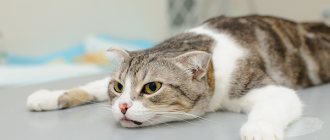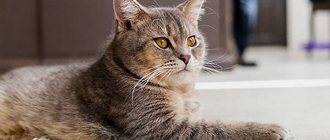The behavior of cats changes with the onset of puberty. When a cat wants a cat, he becomes active, intrusive, begins to “mark” corners in an attempt to attract a female, behaves inappropriately, and meows loudly. It is clear that such behavior irritates the owners of the animal, and is also difficult for the cat to tolerate.
Fortunately, modern veterinary medicine can offer many effective drugs that help cats safely survive the difficult period of sexual activity. In this article we will look at what remedies (drops, tablets) for walking can help your pet.
general information
A cat reaches sexual maturity between its eighth and tenth month of life. It is at this time that the owners of the animal learn for the first time how their pet behaves during the mating season. Most cat owners expect unpleasant surprises: the animal’s behavior usually changes for the worse. From a calm and imposing cat becomes restless, aggressive, looking for something, aiming at corners. On top of everything else, a cat, clouded by “passion,” loses its appetite, as a result of which it noticeably loses weight.
And if cats come into heat only during certain periods: as a rule, once every 4 weeks, then cats with the onset of puberty can and are ready to mate constantly. If the cat is not bred, the logical solution is either castration or reducing the animal’s desire with the help of special drugs.
We note, however, that almost all drugs for cats labeled “anti-sex” contain hormones, so such drugs should not be abused. It is worth using hormonal-based drugs only in extreme cases, when it is necessary to calm the animal, and its behavior has already gone beyond what is acceptable and causes both the owners and the cat itself severe discomfort.
Pills or sterilization?
Cat owners often ask veterinarians what is better: sterilizing their pet or buying her pills that make conception impossible and suppress estrus? Many owners think that the use of contraceptives is a more gentle way to control the reproductive function of a cat, since it does not involve surgical intervention.
However, veterinarians most often recommend surgical sterilization, given the side effects of hormonal contraception for cats. What is the risk of pills and injections with hormonal contraceptives for an animal? Contraceptives change the hormonal levels in the cat's body, which achieves the desired effect: the absence of estrus and the prevention of possible conception. However, the drugs currently on the market have a wide range of side effects. The peculiarities of the cat’s reproductive system are such that with hormonal suppression of the reproductive function, the internal organs are prone to inflammatory processes and neoplasms. The risk of tumors appearing in the reproductive organs of the animal increases.
It is possible that after a few years of taking hormonal contraceptives, the cat will have to have her ovaries and/or uterus removed due to emerging diseases - that is, in the end, hormonal contraception will lead to what the owners were trying to avoid. Unfortunately, a fatal outcome cannot be ruled out.
From a financial point of view, sterilization is more profitable for owners than regularly purchasing tablets for a cat. Once you pay for the surgeon’s services, peace of mind is guaranteed. If you keep your cat on hormonal contraceptives, the financial investment will be higher in the end. In addition, owners will constantly need to remember the need to purchase tablets and provide them to the animal in a timely manner - which requires a certain discipline.
There is a risk of purchasing low-quality medications or ones that are not suitable for your cat (since the body may have individual characteristics). In this case, the risk of disease increases, and sometimes conception occurs (with the birth of non-viable kittens).
There are also arguments against sterilizing cats: an increased risk of obesity and stone formation in the urinary system. But it’s easier to cope with these risks: just choose the right food and follow the veterinarian’s advice regarding the animal’s diet.
Pills
The simplest option is to calm the animal using special tablets. Modern veterinary medicine can offer a choice of two types of drugs:
- calming;
- hormonal.
Let's look at these types in more detail below.
Calming
Sedative drugs are made on a herbal basis. Such tablets must be given to the cat several times a day so that the animal remains calm and behaves appropriately. The composition of calming tablets for cats includes the following herbs:
- mint;
- plantain;
- cottonweed;
- motherwort, etc.
To castrate or sterilize: that is the question
Owners of sterilized animals note that after the operation the behavior of their pets practically does not change, because the level of sex hormones remains at the same level. However, this does not mean that sterilization occurs absolutely without consequences for the animal’s body. At certain moments, real hormonal explosions can be observed when hormone concentrations approach critical values. Sterilized dogs and cats are more susceptible to stress and diseases of the genitourinary system. Significant changes are also observed in behavior: animals often become aggressive, are more difficult to train, and often lose weight for no apparent reason. According to statistics, more than half of animals with oncological pathology of the genital organs were previously sterilized.
Castration is the “gold standard” of veterinary medicine with minimal consequences for the risk of developing cancer of the uterus, ovaries and testicles. In 90% of cases, castration helps to cope with behavioral problems: aggression, dominance, increased excitability.
It has been proven that the life expectancy of neutered cats and dogs increases by an average of 1-3 years, and for some age-related diseases, castration is the only way to save a pet. Castration completely eliminates the risk of developing purulent inflammatory diseases of the uterus and ovaries, as well as prostatitis in cats. According to doctors, it is better to castrate animals at a young age, since surgery is a serious stress for the body, and recovery after surgery in adulthood is more difficult.
Drops
Drugs in this form are much easier to “feed” to a cat, since the liquid solution can be added to food and drink, whereas this is difficult to do with tablets. Today, in any veterinary clinic you can purchase many suitable drops, but most often they give preference to the following:
- Cat Baiyun;
- Contra sex;
- Sex barrier.
Contra-sex and Sex-barrier products operate on approximately the same principle: they are both hormonal and lead to the suppression of the animal’s sexual instinct. The drops are oil-based and are available in standard bottles equipped with a dropper dispenser. As a result of the use of these drugs, the cat temporarily loses its sexual instinct and, accordingly, stops hunting attempts. Note that the drugs are independently eliminated from the cat’s body after 15 days.
Hormonal drops Sex Barrier lead to a noticeable decrease in sexual desire in cats. The animal's excitement subsides, and its behavior becomes “socially acceptable.”
Stop intimate
This is a milder remedy than Sex Barrier, but also hormonal. The product is used when the cat’s sexual instinct is not too clearly expressed.
Gestrenol
This hormonal-based remedy will help quickly reduce your cat’s sexual activity and calm him down. Note that this drug is now chosen by both private cat owners and professional breeders. Gestrenol in the form of drops can naturally affect sexual behavior, inhibiting it. In addition, the product reduces the aggressiveness of the animal, eliminates such a side effect of the sexual instinct as “marking” the territory.
Varieties and release form
How do the pills work?
Natural remedies calm the animal for a short time.
Such long-acting contraceptives for cats are recommended to be given only as prescribed by a veterinarian and in a strictly prescribed dosage, since tablet contraceptives have a number of contraindications and adverse reactions. Drugs are divided into the following types:
- Natural. They contain useful components that do not harm the pet. The disadvantage of such tablets is that the effects pass quickly, as a result of which the risks of pregnancy are high.
- Unnatural. It is more effective, while the cat calms down quickly and does not ask the cat.
Veterinarians do not recommend frequently giving pregnancy pills for cats with unnatural ingredients, since their long-term use can lead to negative consequences.
Injections against partying
Some owners dare to inject their animals with Covinan.
Some owners choose contraception in the form of injections. An effective drug is “Covinan”, the effect of which lasts for six months or 12 months. It is important that the first injection from a cat is given by a veterinarian, and in the future the procedure can be carried out independently at home. If the female is already pregnant, then it is better not to use the medicine, since negative consequences are possible. Like the cat IUD, condom and other contraceptives, injections have a number of advantages and disadvantages, which are presented in the table:
| pros | Minuses |
| Ease of use | Many adverse reactions |
| Long term impact | Cannot be used on pets over 5 years old |
| If the injections are canceled, the cat will be able to safely have offspring in the future. |
Drops: are they effective?
Such drugs do not directly affect the hormonal background of the animal.
To prevent your cat from becoming pregnant, it is recommended to use such contraceptives instead of castration or sterilization. Such products are easy to use and rarely cause negative reactions. Contraceptive drops for cats can have a natural or non-natural base. Their main action is aimed at simulating hormonal levels, while the level of hormones in the cat’s body is not regulated. The female's sexual desire does not decrease during estrus, and the pet gets pleasure without having sex.
Sterilization as a radical method of solving the problem
When birth control pills for cats and other types of medications do not give a positive result and the pet still shows anxiety and aggression during heat, it is recommended to castrate it. At the same time, veterinarians warn that long-term use of even the safest oral contraceptives negatively affects the health of the animal. Manipulation is performed in several ways:
- medications;
- application of chemistry;
- radiation intervention.
The advantage of sterilizing cats is that there is no need to constantly buy and monitor the dosage of medications, and the risks of developing cancer are also reduced.
Side effects
Like any medications, sedatives and especially hormonal medications for cats can also cause a variety of side effects. Thus, sedatives often cause, along with a decrease in libido, lethargy and drowsiness in the animal. The cat may temporarily become apathetic, without interest in responding to any external stimuli.
Often, under the influence of drugs, an animal's appetite decreases. During the period of taking the drugs, a cat can lose up to several kilograms of weight in this way.
Castration as a way out
If the cat’s owners are not ready to tolerate his behavior, risk the pet’s health by constantly feeding him hormonal drugs, and the cat is not valuable for breeding, the question of castration of the animal arises. This surgical operation will relieve the cat and its owners from the side effects of the animal’s sexual activity: territory marking, unbearable behavior, loud “concerts”.
Castration is the removal of a cat's gonads: the operation leads to a complete loss of the animal's reproductive instinct. After the operation, the cat is deprived of the opportunity to have offspring for the rest of his life, but he usually stops marking his territory.
Note that castration makes cats calm and lazy; after this operation, the animal often gains weight, sometimes to the point of obesity. Therefore, after castration, it is necessary to monitor your pet’s diet especially carefully, preventing the animal from overeating.
All drugs are thus reduced to only two options: either hormonal drugs, or lighter ones - sedatives. Which one to choose must be decided on a case-by-case basis with a veterinarian: this will require an examination of the animal for existing contraindications and general health.
What is chemical sterilization of cats?
Many people associate the word “sterilization” with a serious surgical operation during which all reproductive organs are removed from a pet. After the operation, long-term rehabilitation follows, wearing a bandage.
Surgical sterilization is a difficult ordeal for both pet and owner. However, there are more gentle ways to prevent the appearance of unwanted offspring in a domestic cat - chemical sterilization.
Chemical sterilization involves introducing hormonal drugs based on the female hormone progesterone into the pet’s body.
This substance suppresses the functioning of the ovaries, which prevents the possibility of pregnancy and the birth of offspring.
Unlike surgical intervention, chemical sterilization is not an operation and is much easier for the pet to tolerate.
The injected drug blocks the cat's urge to reproduce, so the pet does not suffer or experience stress and feels calm. Moreover, chemical sterilization is a reversible process.
Reference!
At any time, at the owner's request, it is possible to stop administering the drug, which will make the cat again ready for procreation.











